

3 8 1 Boston Matrix Overview. 3.8.1 Boston Matrix, Culture and Dividend Yield. These two pieces of video evidence on South Korean multinational giant Samsung are pure business studies gold - particularly for students preparing their evidence for AQA BUSS4.
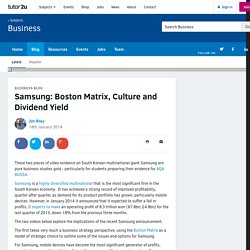
Samsung is a highly diversified multinational that is the most significant firm in the South Korean economy. It has achieved a strong record of improved profitability, quarter after quarter, as demand for its product portfolio has grown, particularly mobile devices. However, in January 2014 it announced that it expected to suffer a fall in profits, It expects to make an operating profit of 8.3 trillion won ($7.8bn; £4.8bn) for the last quarter of 2013, down 18% from the previous three months. The two videos below explore the implications of the recent Samsung announcement. The first takes very much a business strategy perspective, using the Boston Matrix as a model of strategic choice to outline some of the issues and options for Samsung.
Peak social media? Facebook, Twitter and Snapchat fail to make new friends. Snapchat – falling into line behind Facebook and Twitter – has become the latest social network to report declining user numbers in its half year results.
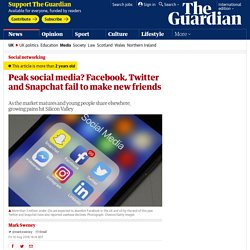
Snap Inc, the parent company of the app known for its disappearing messages and photograph filters, revealed that in the three months to the end of June active daily user numbers shrank from 191 million to 188 million, a 1.5% decline. It followed a controversial redesign that had prompted more than a million people to sign a petition to reverse the “annoying” changes. It has also faced intense competition from Facebook-owned Instagram.
The battle to keep the attention of the social media set, and especially younger users, has been getting tougher. Earlier this year a tweet from Kylie Jenner, in which she asked her 25 million followers “does anyone else not open Snapchat any more?” Kylie Jenner (@KylieJenner)sooo does anyone else not open Snapchat anymore? Coca-Cola preps Diet Coke overhaul in the UK to boost sales. Coca-Cola is overhauling its Diet Coke brand in the US and has promised “exciting” changes in the UK to fight declining sales.
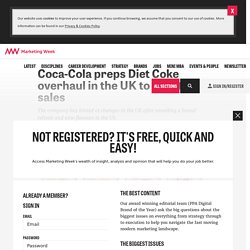
Diet Coke is rebranding with new packaging, flavours and a new campaign. The original Diet Coke flavour will continue, and the four new flavours include ginger lime, feisty cherry, zesty blood orange and twist mango. The packaging is also changing with slimmer cans, a sharper logo and different colours representing each flavour. The launch will start mid-January in North America followed by Canada in February and a Coca-Cola spokesperson tells Marketing Week there are changes in store for the UK as well. “In the UK we also have some exciting plans for the brand this year and will be able to reveal more in the coming months.”
It is currently unclear what the plans are for the UK, but a brand refresh could be timely as Nielsen data shows off-trade Diet Coke sales have dropped 0.6% over the past year to £420.2m. Y12 Marketing mix project. 3.3.4 Examining the Product Life Cycle. 3.3.4 Marketing Mix: Introduction to Promotion. 3.3.4 Prada seeks younger customers in bid for growth. Image copyright AP Italian luxury fashion group Prada has predicted a return to growth as it seeks to connect with younger customers through online sales and flexible pricing.
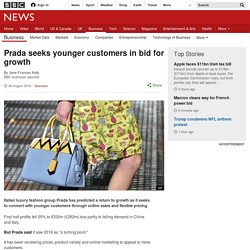
First half profits fell 25% to €330m (£282m) due partly to falling demand in China and Italy. But Prada said it saw 2016 as "a turning point. " It has been reviewing prices, product variety and online marketing to appeal to more customers. Revenue fell 15% to €1.55bn compared to this time last year and in April Prada announced its lowest profits in five years. It was previously criticised for opening too many new stores and failing to invest enough online. Prada said it was on track with plans to double its e-commerce sales over the next two years by increasing the number of products it offered online, particularly shoes. It will also expand its social media activities so it can raise its profile among "the 'always connected' millennials," referring to the 20s -30s age group.
Image copyright Getty Images. 3.3.4 - Starbucks drops its name and the word coffee from logo. Starbucks, the world's largest chain of coffee shops, has unveiled a new logo which it says indicates its intention to move beyond its core product.
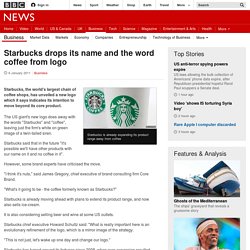
The US giant's new logo does away with the words "Starbucks" and "coffee", leaving just the firm's white on green image of a twin-tailed siren. Starbucks said that in the future "it's possible we'll have other products with our name on it and no coffee in it". However, some brand experts have criticised the move. "I think it's nuts," said James Gregory, chief executive of brand consulting firm Core Brand. "What's it going to be - the coffee formerly known as Starbucks? " Starbucks is already moving ahead with plans to extend its product range, and now also sells ice-cream. It is also considering selling beer and wine at some US outlets. Starbucks chief executive Howard Schultz said: "What is really important here is an evolutionary refinement of the logo, which is a mirror image of the strategy. 3.3.4 Train fares rise by an average of 2.3% Image copyright PA Rail passengers are facing higher fares across the UK as average price increases of 2.3% are introduced on the first weekday of the new year.
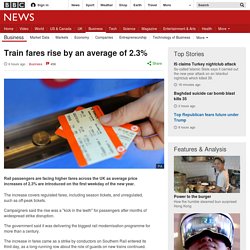
The increase covers regulated fares, including season tickets, and unregulated, such as off-peak tickets. Campaigners said the rise was a "kick in the teeth" for passengers after months of widespread strike disruption. 3.3.4 Dynamic Pricing for Restaurants - An Anti-Uber… 3.3.4 Impressive Numbers for the Amazon Echo - Product. 3.3.4 Poor Porridge Promotion! 3.3.4 Greggs - Scone, but not forgotten! 3.3.4 Disney theme park opens in Shanghai - Marketing Mix. 3.3.4 Dragons' Den - Entrepreneurs - Adejare Doherty. 3.3.4 Marketing: The Boston Matrix.
3.3.4 The 4Ps Marketing Mix. 3.3.4 B2C vs B2B: The Basics. 3.3.4 The Boston Matrix: Identifying Your Cash Cows, Dogs, Question Marks, and Stars. 3.3.4 Marketing: Extended Marketing Mix.